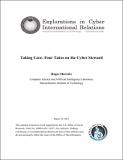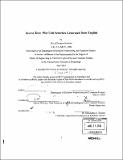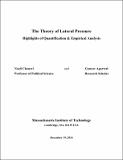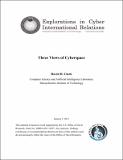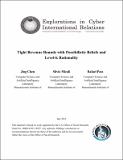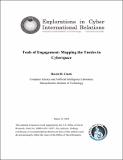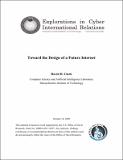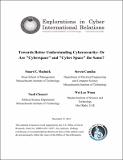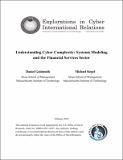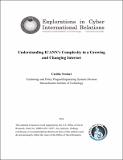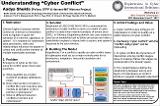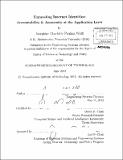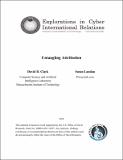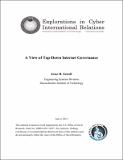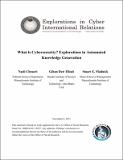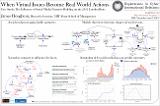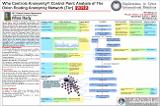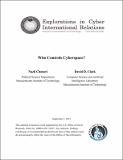Browsing Explorations in Cyber International Relations (ECIR) by Title
Now showing items 96-113 of 113
-
Taking care: Four takes on the cyber steward
(Canada Centre for Global Security Studies (Canada Centre) at the Munk School of Global Affairs at the University of Toronto, 2012-03-18)Stewardship denotes a custodial, non-proprietary relationship to a resource or domain. The notion of a “cyber steward” resonates with those of us who regard cyberspace as a commons or domain that belongs to no one, and yet ... -
Text to Text : plot unit searches generated from English
(Massachusetts Institute of Technology, 2010)The story of Macbeth centers around revenge. World War I was started by an act of revenge. Even though these two stories are seemingly unrelated, humans use the same concept to draw meaning from them. Plot units, revenge ... -
The Theory of Lateral Pressure Highlights of Quantification & Empirical Analysis
(SSRN, 2016-11-11)Lateral Pressure refers to any tendency (or propensity) of individuals and societies to expand their activities and exert influence and control beyond their established boundaries, whether for economic, political, military, ... -
Three views of cyberspace
(© Massachusetts Institute of Technology, 2011-01-05)The purpose of this paper is to draw attention to an important but perhaps under- appreciated aspect of the Internet: the emergent idea of a global commons in the use of the Internet, in which people might transcend national ... -
Tight revenue bounds with possibilistic beliefs and level-k rationality
(© The Econometric Society, 2015-07)Mechanism design enables a social planner to obtain a desired outcome by leveraging the players’ rationality and their beliefs. It is thus a fundamental, but yet unproven, intuition that the higher the level of rationality ... -
Tools of engagement: Mapping the tussles in cyberspace
(© Massachusetts Institute of Technology, 2012-03-12)This paper has been prepared as part of the Explorations in Cyber International Relations project being carried out at MIT, Harvard and collaborating institutions. The goal of this paper is to lay the groundwork for the ... -
Toward the design of a future Internet
(© Massachusetts Institute of Technology, 2009-10-10)This document is one very preliminary proposal for the design of a Future Internet—an outline of requirements and architecture. This document should only be seen as a first step in such a proposal; there are many parts ... -
Towards better understanding cybersecurity: Or are "cyberspace" and "cyber space" the same?
(© Elsevier B.V., 2012-12-15)Although there are many technology challenges and approaches to attaining cybersecurity, human actions (or inactions) also often pose large risks. There are many reasons, but one problem is whether we all “see the world” ... -
Understanding cyber complexity: Systems modeling and the financial services sector
(© Massachusetts Institute of Technology, 2010-02)Recent developments within the financial services sector have demonstrated that as the diffusion of cyber enabled technologies increases, so too does dependency on a cyber infrastructure susceptible to failure, outages, ... -
Understanding ICANN’s complexity in a growing and changing Internet
(© Massachusetts Institute of Technology, 2014)The ever-increasing relevance of the Internet in all aspects of our lives has significantly raised the interest of cyberspace in the political, economical and international spheres. Internet governance and its future design ... -
Understanding “Cyber Conflict”
(Explorations in Cyber International Relations., 2012-11-06)Problem: Emergence of cyber as the new arena for conflict raises three basic questions: (a) What qualifies as a Cyber Conflict? (multiple definitions exist); (b) Does intervention of cyber in conflict life-cycle requires ... -
Unraveling Internet identities : accountability & anonymity at the application layer
(Massachusetts Institute of Technology, 2012)Both anonymity and accountability play crucial roles in sustaining the Internet's functionality, however there is a common misconception that increasing the anonymity of Internet identities necessitates diminishing their ... -
Untangling attribution
(© National Academy of Sciences, 2010-01-01)In February 2010, former NSA Director Mike McConnell wrote that, “We need to develop an early- warning system to monitor cyberspace, identify intrusions and locate the source of attacks with a trail of evidence that can ... -
A view of top-down internet governance
(© NANOG, 2012-06-04)Does the audience want more government and regulatory involvement in peering and interconnection world? -
What is cybersecurity? Explorations in automated knowledge generation
(© Massachusetts Institute of Technology, 2012-11-06)This paper addresses a serious impediment to theory and policy for cybersecurity: Trivial as it might appear on the surface, there is no agreed upon understanding of the issue, no formal definition, and not even a consensus ... -
When virtual issues become real world actions
(Explorations in Cyber International Relations, 2012-11-06) -
Who controls anonymity? Control point analysis of the Onion routing anonymity network (TOR)
(Explorations in Cyber International Relations, 2012-11-06)Anonymity networks have played major roles in censorship circumvention and various benign or malicious activities in the cyber domain. Hence, those networks became well defined targets of repressive regimes or law enforcement. ... -
Who controls cyberspace?
(Sage Journals/© Nazli Choucri, & David D. Clark, 2013-09-01)When Wikileaks released hundreds of thousands of Iraq War logs and diplomatic cables in 2010, a horrified US government sprang into action—but the classified information the government hoped to keep from public view quickly ...

